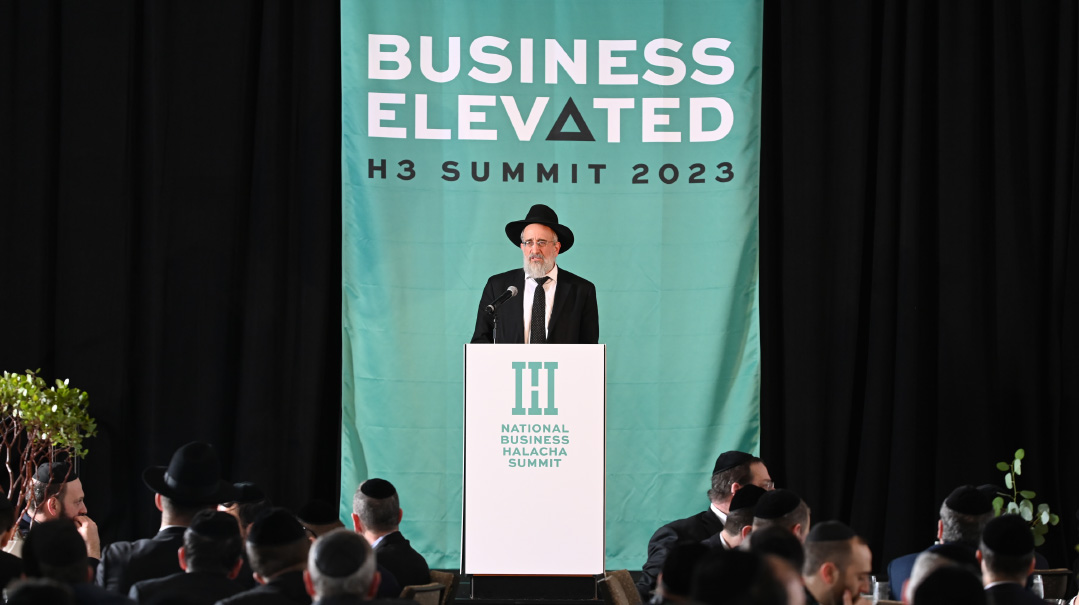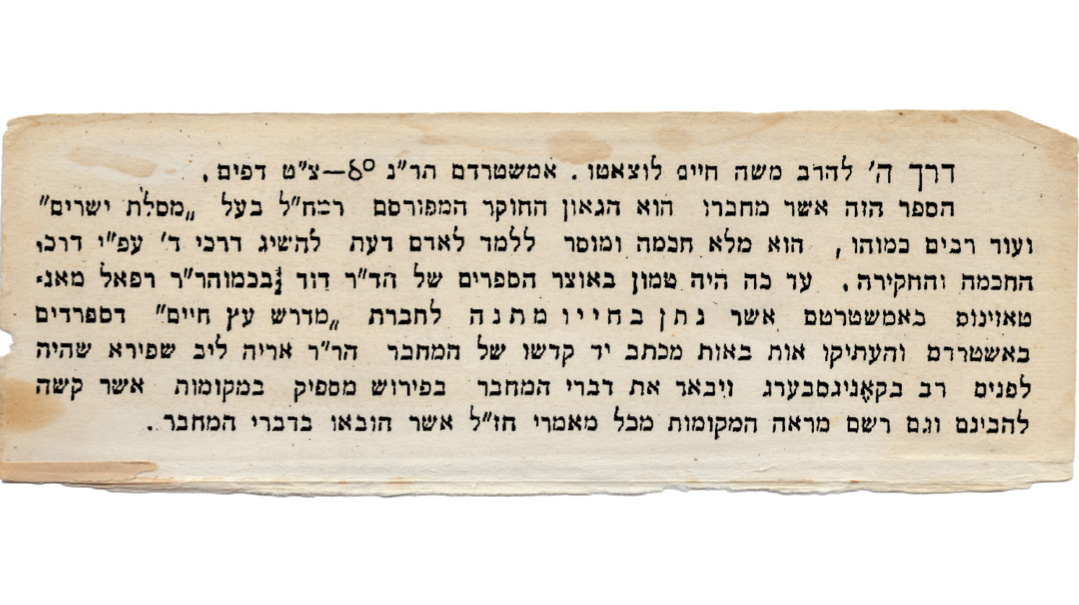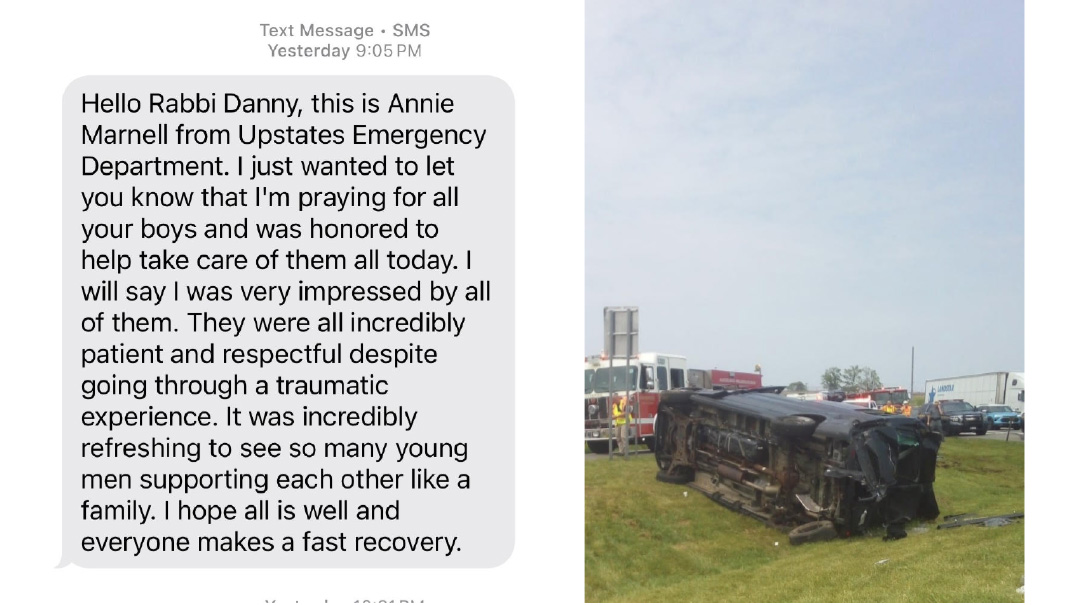The Moment: Issue 993
| January 2, 2024“By us Jews,” said Rav Weinberger, “finance is no less of a religious area than prayer”

Living Higher
Hundreds of attendees packed the Westin hotel in Chicago last week for the H3 Business Halacha Summit hosted by the Agudath Israel of Illinois. In session after session, rabbanim and leading balabatim shared insights with the participating businessmen on halachah and hashkafah topics relevant to their various industries. Addressing the crowd at the opening lunch, Rav Yisroel Reisman, rosh yeshivah of Torah Vodaath, recounted a story that set the tone for the event.
The Seridei Eish, Rav Yechiel Yaakov Weinberg, was once approached by a non-Jewish professor, who complained that the Jewish religion wasn’t a logical one. As evidence, he brought up the point that if two Jews were involved in a financial dispute and the great Kaiser Wilhelm came to offer testimony, a beis din wouldn’t recognize it. Yet, continued the professor, if a simple, poor Jew were to come in and offer the same exact testimony, the dayanim would accept it. How, the professor challenged, does that make sense?
Rather than answer the question directly, Rav Weinberg seemingly strengthened the claim by adding that not only would Kaiser Wilhelm’s testimony not be accepted in a beis din, but that also if there were nine Jews waiting to pray, the Kaiser wouldn’t be able to complete the minyan while a 13-year-old boy could.
“Well,” said Rav Weinberger’s challenger, “that I can understand — prayer is a religious obligation, and as such, only religious people would be able to be take part.”
“By us Jews,” said Rav Weinberger, “finance is no less of a religious area than prayer.”
Working for a Higher Purpose
The 2023 H3 Business Halacha Summit convened last Wednesday and Thursday in Chicago, giving attendees the opportunity to gain clarity from prominent poskim, rabbanim, and business leaders on how to address the most pressing halachic challenges confronting us in the workplace.
“We’ve seen the outpouring of support and empathy for our brethren in Eretz Yisrael. But it can’t be that only when there is a tragedy do we display that concern for our brothers. When a frum Yid is sitting across from us at the negotiating table, we have to deal with them with that same level of care and concern.”
—Yitzchok Fuchs (Y Fichs.JPG), Partner, Conserve Holdings
“If one compromises on his standards in Yiddishkeit when dealing in business, not only is it the wrong thing, it just doesn’t make sense from a hishtadlus perspective. Hashem is in charge; shouldn’t we act in a way that brings nachas to Him?”
—Tzvi Zicherman, Managing Partner of LTC Ally’s financial services division
“I was approached a couple years ago about taking a new lay-leader position at my children’s school, Arie Crown Hebrew Day School, a position that would without a doubt take a lot of time and add stress to my already hectic life. I was very torn and concerned about this conflict. After discussing the opportunity with my wife and rebbeim, I also felt obligated to ask permission from the owner of my company as well. After all, there was a real chance that taking on something of this level would put certain tasks and my focus at work in jeopardy.
After talking it through with him, Chaim Rajchenbach assured me that despite the fact that the position would most definitely add to my plate, he was confident I would find the time and ability to make this work. After all, if this was something lishmah and something I was passionate about, Hashem would be there to help.
Still, I pressed him and asked, 'Despite all of this, why should I punish myself by adding more stress and work by accepting this position?'
Chaim answered me with five simple words, words I remind myself about numerous times a week when I am overwhelmed and overworked. He said, 'Because that’s why we’re here.'"
—Daniel Garden, General Counsel for Cascade Capital Group
“There are many bnei Torah, especially those who spent many years in kollel, who feel that the day they walked out the door of yeshivah, the rest of their lives became b’dieved… almost as if they were climbing the stairs of the wrong skyscraper. But we have learned time and again from our gedolim that if this is where you are, this is where you are supposed to be. And this is where you are going to reach your shleimus to be a true eved Hashem.”
—Rabbi Yaakov Robinson, Menahel of the Agudas Yisroel Council of Synagogue Rabbonim and Rav of Beis Medrash Mikor Hachaim in Chicago
Mr. Lebovits detailed initiatives in Klal Yisrael started by balabatim who were intent on making a small, impactful change that ended taking the community by storm, such as Veyimaen, Oraysa, Toraso B’umnaso, and Shai Graucher’s Chesed V’rachamim. He encouraged attendees to focus just on taking those first baby steps, with confidence that Hashem will take care of the rest.
“We’re able to hyper-analyze success but rarely able to predict it. Because success is based on siyata d’Shmaya.”
—Rav Uri Deutsch, Rav of the Forest Park community in Lakewood, NJ
“Just as a person has to make a cheshbon hanefesh with regard to his limud Torah and tefillah, if the bulk of one’s day is spent in the business world, then whether or not we act with integrity, honesty, and strive to be mekadeish shem Shamayim in every area have to be part of one’s cheshbon hanefesh.”
—Rav Uren Reich, Rosh Yeshivah of Ohr Zechariah
“Success is up to the Ribbono shel Olam, but it’s our job to take those first steps.”
—Barry Lebovits, Managing Partner of Rivulet Capital
“We may have different professions, but we are all one. And what we do has an effect on one another. My challenge may be Klal Yisrael’s left hand, and your opportunity may be the right hand. We came here to realize who we are and to realize what our singular mission should be. We are leaving H3 not just adjusting short-term business goals, but making sure that our individual missions concur with the singular mission of Klal Yisrael.”
—Rabbi Yitzchok Ehrman, one of the H3 founders and COO of the national Agudah
(Originally featured in Mishpacha, Issue 993)
Oops! We could not locate your form.







